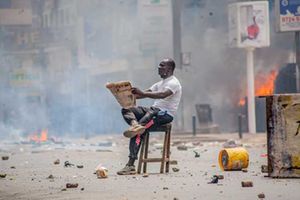
Demonstrators march along Kenyatta Avenue Nairobi on June 23, 2024, during protests against Finance Bill 2024.
‘Has President William Ruto become a captive of the Kenyan youth? Is State House now an executive prison shielding the President from a Nouvelle Generation chanting Ruto Must Go?”
This is now a familiar refrain in conversations with foreigners who are intrigued by recent political developments in Kenya where ‘youth power’ has touched off a chain reaction that is currently a subject of discourse in Africa and beyond.
It is a summation of how the people can enforce policy decisions without using the gun. The youth or Gen Z, in an unprecedented reaction to the Finance Bill 2024, stormed Parliament in protest. The Bill had a raft of punitive proposals that the executive had forced through the legislature despite the hue and cry of the citizenry.
Gen Zs’ message to the executive and pliable legislature was succinct: they would no longer be taxed without being heard; they were piqued by a president flying his family in a Sh200 million chartered flight on foreign official trips but ignoring the plight of 46,000 Junior Secondary School teachers and thousands of doctors and nurses who earn a pittance for a living.
The rejection of the finance policy immediately drew parallels with the June 1976 Soweto Uprising in South Africa when students rejected the introduction of Afrikaans language – perceived as oppressors’ tool of subjugation – in the curriculum. In Kenya, the youth were opposed to – in part – structural adjustment programmes prescribed by the International Monetary and World Bank. Among other adjustments, IMF wants the government to raise taxes to bridge a Sh702 billion deficit in the Sh4.2 trillion budget, downsize of the civil service, fast-track privatisation of the state corporations.
The spinoffs of the prescriptions are familiar to Kenya and by extension Africa. These IMF and World Bank prescriptions in 1980-1990s, in addition to theft of public resources, brought the economy on its knees and are blamed for subsequent economic and social mess in Kenya, which appeared to be on the mend during the tenure of President Kibaki between 2002 and 2024.
Punished
However, stealing made a frenetic return during the tenure of President Uhuru Kenyatta, but former Mukurweini MP Kabando wa Kabando says under President Ruto, looting is a religion and the contrary is punished. Kabando explains that recent absolution of Agriculture Cabinet Secretary Mithika Linturi from the fake fertiliser scandal, former Trade (now Public Service) Cabinet Secretary Moses Kuria was pardoned in the cooking oil and toxic sugar scandals.
“The solution to this ‘holy’ war against arrogance, myopia and looting is only a resignation of Ruto and his entire gluttonous goons in government. Public relations, blame shifts, dithering or half-hearted measures can’t and won't do.
No matter what Ruto does now, the die is cast. Kenya will never be the same again. And for Kenya to as different as the passions and visions of Gen Z, Ruto, and his entirely kleptocracy have to exit. Clearly, Ruto and a Gen Z compliant state are incompatible. As it is now, Ruto is a stranger at State House. Everyone in Ruto’ s palace who still has consciousness and conscientiousness is distancing because the ship has sunk,” says Kabando.
In an interview with major television stations in Kenya – largely seen as damage limitation – Ruto explained his absence from public engagements as informed by “self- soul-searching”. The military was reportedly deployed to carry out civilian duties in anticipation of a ‘people power’ storm in State House. The brute force to quell the uprising resulted in the extra-judicial killings of reportedly 41 peaceful protesters and injured hundreds, according to the Kenya National Commission of Human Rights.
As the executive recalled the controversial law hours after Gen Z stormed Parliament, the rest of the continent that is historically resigned to presidential “my-way-or-the-highway” decrees was awed by the impact of the movement that ricocheted in capitals where dictatorship, corruption, rights violations and deprivation are executive way of life. However, consistent in the discourse in the aftermath of the youth rebellion in Kenya is the extent to which the ‘Nouvelle Generation’ is excluded in economic and political decision-making on the continent.
Speaking to The Weekly Review, former lecturer at Makerere University and prolific political commentator, Prof Oweyegha Afunaduula, acknowledged that panic has already soaked the political establishment in Uganda, where President Yoweri Museveni is keenly following the unfolding scenario in Kenya. “State House is the prison (cell for Ruto). In Uganda, Museveni is worried. Totally worried, but he is behaving as if nothing will come their way.
He started this (clampdown on youth activism) by imposing heavy taxes on social media. VPN has helped Uganda to keep afloat,” says Prof Afunaduula, President Museveni’s former collegemate at University of Dar es Salaam, Tanzania. The youth, according Prof Amukowa Anangwe, are powder keg regimes in Africa that have for long been ignored but the explosion of anger in Kenya sets the tone for recurrence on the continent unless power wielders shape up.
Highly educated youth
“I have seen the international coverage of the demonstrations in Africa and beyond. Parliamentarians in Ghana, Tanzania, Uganda, Zambia have alluded to it. In fact in Uganda, Museveni has issued a threat to deal with such mobilisers. I hear similar demonstrations are planned for Uganda on July 23. So this is phenomenal. But what is coming through ironically is that Kenyan is a democratic giant in Africa to the extent that the population can mobilise and rise against bad policies and oblige the rulers to relent. In fact, Nigerians are saying this would be inconceivable in their country, and Kenyans have put them to shame by their courage,” Prof Anangwe, a former political science lecturer at Dodoma University in Tanzania, told The Weekly Review.
Since independence in 1963, Kenyan youth have often been treated to ‘political lullabies’ – the most common being “youth are leaders of tomorrow”. However, Dr Sylvester Anami, says there is a generational revolution that places the youth at the centre of decision-making. More significantly, explains Dr Anami, there is a new generation of highly educated youth who want to be in charge of their destiny devoid of World Bank and IMF “choreographed” economic policies that ensure Africans are steeped in abject poverty.
“This is a form of colonialism young Africans are prepared to free themselves from. The youth are promised non-existent jobs abroad. That it is an admission by Ruto that he is incapable of creating employment in Kenya. The promise of jobs abroad is colonialism,” Dr Anami, a biotechnologist and politician, explains the dissonance in Ruto’s promises and reality. He says Kenyan youth are frustrated by similar economic and political situations around Africa.
“Take, for example, Uganda. Museveni has been there for 40 years. What new ideas will persuade the youth to retain him in power? The protests will have a ripple effect and we on the cusp on a new political dispensation. What has happened in Kenya has elicited debate on some the promises the politicians in Africa promise but do not deliver,” says the scientist who ran for Kakamega County governorship in 2022.
The youth uprising has a echoes of the 1980s political ‘revolution’ that was masterminded youthful leadership – young university graduates – that were nicknamed Young Turks. The Young Turks were keen on political diversity, which hitherto had been checked by a presidential decree in 1982 in the wake of the aborted 1982 coup d’état against President Daniel arap Moi.
South African-based Prof A A Talukhaba says the situation in Kenya has been a work-in-progress but political thinking and economic policies have not been changing in tandem with the evolving demographics. The Gen Z uprising, he says, has been in the making for years but the political class was impervious to their quest for economic liberation that is by access to New Age (technology).
“Youth around the world have been involved in agitating for socio-political change… In the 80s and 90s, the youth were a pain in Moi’s regime. Remember the ‘Seven bearded sisters’?
The youth in South Africa were at the forefront of opposing the apartheid regime. Remember the 1976 Soweto Uprising,” says Prof Talukhaba, who teaches at Tshwane University of Technology in South Africa. Unlike Kenya, he explains, the South African government is receptive to criticism. President Ruto peddles lies that the youth easily fact-check and disprove.
“If you compare the two countries, South Africa has a more tolerant society hence if something like that happened here, the government would listen and you will not expect death, as we have seen in Kenya. That would be the same in other African countries where questioning the government is as good as declaration of a coup. In panic the government will unleash the wrath of police, the army and goons to crush the demonstrators.”











